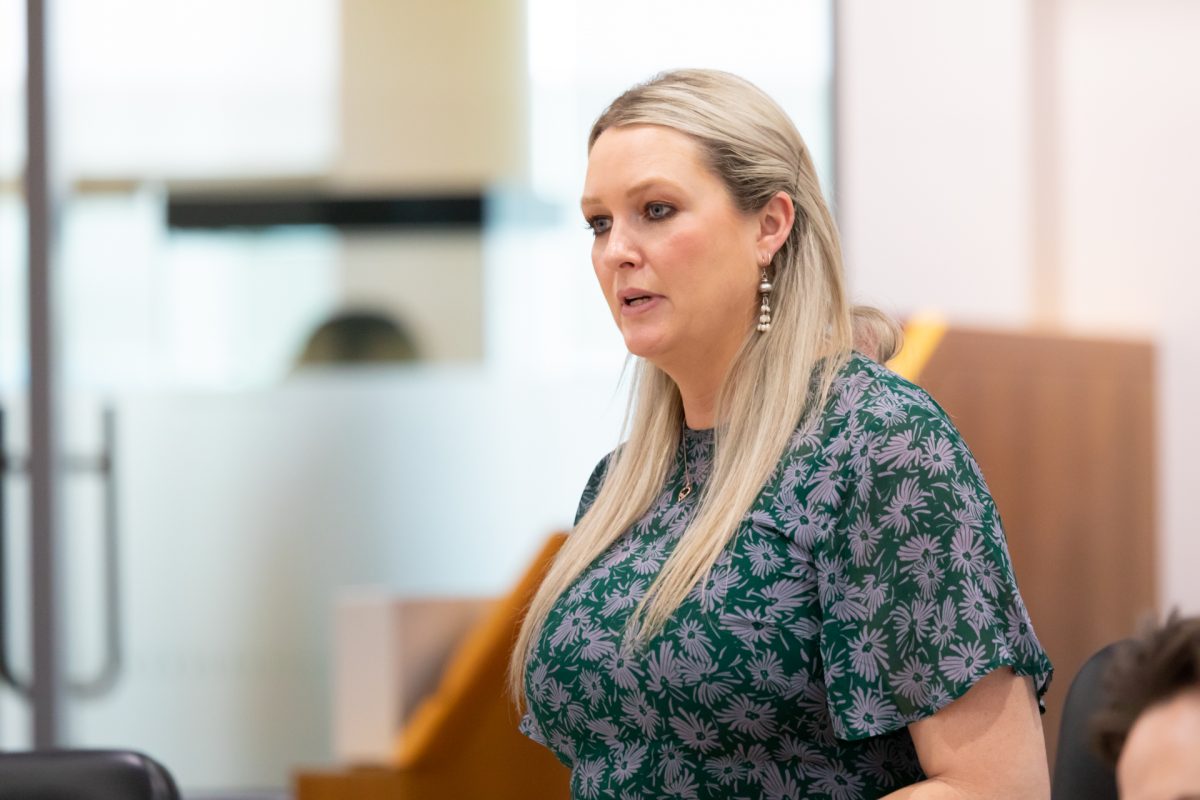
Dr Marisa Paterson has introduced proposed law changes to override a High Court decision around what prosecutors can submit during an offender’s sentencing. Photo: Michelle Kroll.
The ACT could soon become the second jurisdiction to overthrow a High Court decision which has set a legal precedent for the past 10 years.
The move has some in the legal community worried it won’t have the intended effect.
Labor backbencher Dr Marisa Paterson introduced the Crimes (Sentencing) Amendment Bill 2024 during the March sitting of the Legislative Assembly which would allow all parties to make sentencing submissions to criminal proceedings.
The High Court decided on the case of Barbaro v The Queen in 2014, which essentially decided the duty of the prosecution was to draw a judge’s attention to the submitted facts of the cases, the relevant legal principles that should be applied, and what had been done in comparable cases.
This is so the court can then decide a sentence without the prosecution offering its view about an appropriate or available sentence range, particularly if prison is being considered.
Dr Paterson said her amendments would override this decision and, while the sentence would still be at the judge’s discretion, she felt it would result in “greater transparency and more robust” sentencing decisions.
“There has been a lot of public discussion around sentencing in the ACT over the last couple of years, and given the current situation where the prosecution cannot provide advice to the judge on sentencing, there are rightly concerns that sentencing is biased towards the defence,” she said.
“Introducing or re-instating sentencing submissions provides an equal opportunity for both defence and the prosecution to provide advice to the judge on sentencing range.”
Currently, the prosecution can inform a judge or magistrate about the type of sentence available under law, as well as submit what it thinks is the objective seriousness of the crime(s), the moral culpability and remorse of the offender, victim impact statements, and draw reference to sentences for similar cases to assist the court.
The prosecution is also required to ensure the court isn’t brought into disrepute through a sentencing decision.
The defence can counter with what it believes is the objective seriousness, remorse and moral culpability, as well as give evidence on an offender’s background and how that may have influenced the decision making or criminality.
Pre-sentence reports are also prepared to consider an offender’s suitability for various sentencing options available under the legislation.
Dr Paterson said the changes would also go some way to giving victims more of a voice during sentencing.
“The legislation may also provide judges in the ACT with some context of differing opinions on sentencing and require more robust reasoning for the sentences that they deliver,” she said.
“Ultimately, the more information that a judge can take into consideration, the better the outcome.”
She argued it could also reduce the number of appeals for sentences perceived to be inadequate.
The ACT Office of the Director of Public Prosecution’s annual report from 2021/22 noted there had been a record number of appeals, including four to the High Court.
In 2022/23, there were 11 appeals on the grounds of a sentence’s inadequacy.
“If a sentencing court can be told after the event, on an appeal by the prosecution, that the sentence it has imposed is outside the available range for reasons articulated after the event by the appellate court … the same sentencing court should, in principle, be able to expect to be assisted before the event by a prosecution,” Dr Paterson said.
“I see this as a great opportunity for all parties in sentencing decisions to provide evidence to the judge, where the judge can then proceed to making sentencing decisions with greater transparency and more robust articulation of why those sentences are appropriate.”
Dr Paterson noted ACT Policing, the Victims of Crime Commissioner and DVCS, among others, supported her proposed bill.
But not everyone agreed it would achieve the outcomes for victims.
Overriding Barbaro would have “no bearing at all” on giving a voice to victims, according to the ACT Bar Association’s Criminal Law Committee.
“It is not suggested, appropriately, that victims would be permitted to submit what length of sentence should be imposed,” the committee noted.
“The Bar Association is concerned that Dr Paterson’s statements misconstrue what the current sentencing practice is in the ACT, and may lead the public into misunderstanding that practice.”
The committee argued prosecutors should not give such an opinion about range beyond suggestions based on relevant sentencing factors and principles, as they weren’t to “seek a conviction or a particular sentence at all costs”.
“They still provide very valuable assistance to the sentencing court through the bounds of the submissions which are routinely made, including whether any sentence proposed by defence may be erroneous,” the committee noted.
Overall, the ACT Bar Association has called the proposed law change “unnecessary”.
“It may lead to more appeals either because the ‘range’ debated was clearly wrong or because the judge ignored the range and sentenced outside of it, leaving a party feeling particularly aggrieved,” it said.
“It goes further by introducing the prosecutor’s opinion about what sentence should be imposed, which is beyond the role of the prosecutor, rather than assisting the court not to fall into appealable error.”
Queensland is the only jurisdiction which has overridden the Barbaro ruling.
The association noted it was not aware of any issues arising from QLD’s decision to override Barbaro, nor if it had reduced appeals.
Original Article published by Claire Fenwicke on Riotact.








